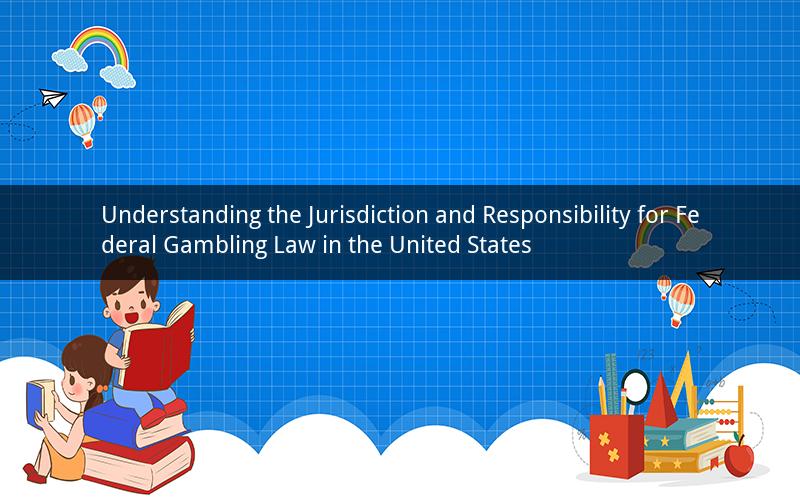
Introduction:
Gambling is a topic that has sparked numerous debates and discussions over the years. With the growing popularity of online gambling and the presence of land-based casinos, the need for effective regulation and oversight is paramount. One key question that arises is: who is responsible for federal gambling law in the United States? This article delves into the complexities of federal gambling laws and identifies the entities and individuals who bear the responsibility for enforcing and shaping these regulations.
1. The Federal Government's Role:
The federal government plays a significant role in regulating gambling in the United States. The primary agency responsible for overseeing gambling activities at the federal level is the Department of the Interior, specifically the National Indian Gaming Commission (NIGC). The NIGC was established in 1988 under the Indian Gaming Regulatory Act (IGRA) to regulate gaming on Indian lands.
The Department of Justice (DOJ) also has a role to play in federal gambling law. The DOJ is responsible for enforcing federal laws related to gambling, including the Wire Act of 1961 and the Unlawful Internet Gambling Enforcement Act (UIGEA) of 2006. These laws aim to prevent illegal gambling activities, including those involving interstate and international betting.
2. The States' Role:
While the federal government has a significant say in gambling regulation, states also play a crucial role. Each state has the authority to regulate gambling within its borders, and this autonomy varies from state to state. Some states have legalized and regulated various forms of gambling, while others have prohibited it entirely.
State governments have the power to establish their own gambling laws and regulations, which may include licensing requirements, age restrictions, and specific rules for different types of gambling activities. Additionally, states can enter into compacts with other states to share revenue from gambling activities, as seen in agreements related to riverboat casinos and racetrack betting.
3. The Role of Law Enforcement Agencies:
Several law enforcement agencies have a role to play in enforcing federal gambling laws. The Federal Bureau of Investigation (FBI) works in collaboration with other agencies, such as the DOJ and the Internal Revenue Service (IRS), to investigate and prosecute illegal gambling operations. The FBI focuses on large-scale gambling activities that involve organized crime or violate federal laws.
The Alcohol, Tobacco, Firearms, and Explosives (ATF) agency also has jurisdiction over certain aspects of gambling, particularly in cases involving firearms and explosives. The ATF can investigate and enforce laws related to the illegal use of these items in connection with gambling activities.
4. The Role of Gaming Industry Associations:
Industry associations also play a role in shaping gambling laws and regulations. Organizations such as the American Gaming Association (AGA) represent the interests of the gaming industry and work towards creating a regulated and responsible gambling environment. These associations engage in lobbying efforts, provide educational resources, and promote responsible gaming practices.
5. The Role of Consumers:
Ultimately, consumers have a role to play in shaping gambling laws and regulations. By voicing their opinions and advocating for responsible gaming practices, consumers can influence the decisions made by government agencies and industry stakeholders. Support for responsible gambling initiatives and awareness of the risks associated with gambling can contribute to the overall regulation and regulation of the industry.
Frequently Asked Questions:
1. Q: Can the federal government override state gambling laws?
A: Yes, the federal government can override state gambling laws in certain situations. The Indian Gaming Regulatory Act, for example, provides a framework for regulating gaming on Indian lands, which may supersede state laws.
2. Q: How do state governments regulate gambling within their borders?
A: State governments regulate gambling through the enactment of laws and regulations specific to their jurisdiction. These regulations may include licensing requirements, age restrictions, and specific rules for different forms of gambling.
3. Q: Can individuals be prosecuted for gambling on their own property?
A: Yes, individuals can be prosecuted for gambling on their own property if their activities violate federal or state gambling laws. This includes operating an unlicensed gambling establishment or engaging in illegal forms of gambling.
4. Q: How do law enforcement agencies investigate illegal gambling activities?
A: Law enforcement agencies investigate illegal gambling activities through various means, including surveillance, interviews, and analysis of financial transactions. They may collaborate with other agencies and utilize technology to gather evidence and identify those involved in illegal gambling operations.
5. Q: Can individuals report illegal gambling activities?
A: Yes, individuals can report illegal gambling activities to law enforcement agencies. Reporting can be done anonymously, and whistleblowers may be protected under certain laws and regulations.
Conclusion:
The responsibility for federal gambling law in the United States is shared among various entities, including the federal government, state governments, law enforcement agencies, gaming industry associations, and consumers. Each of these groups plays a crucial role in shaping and enforcing gambling regulations to ensure a safe, fair, and responsible gambling environment. Understanding the jurisdiction and responsibilities of these entities is essential for a comprehensive understanding of federal gambling law.